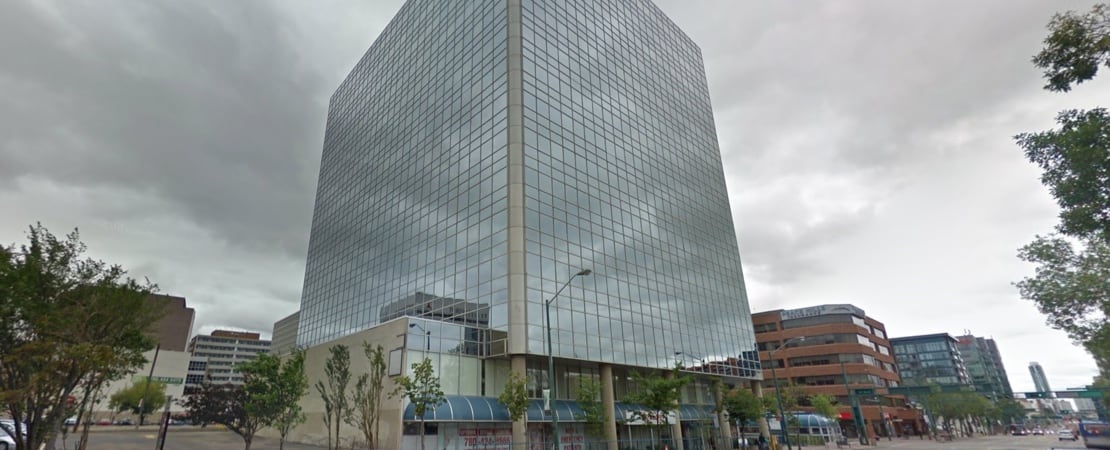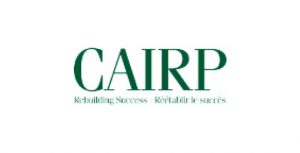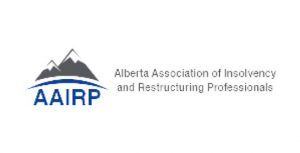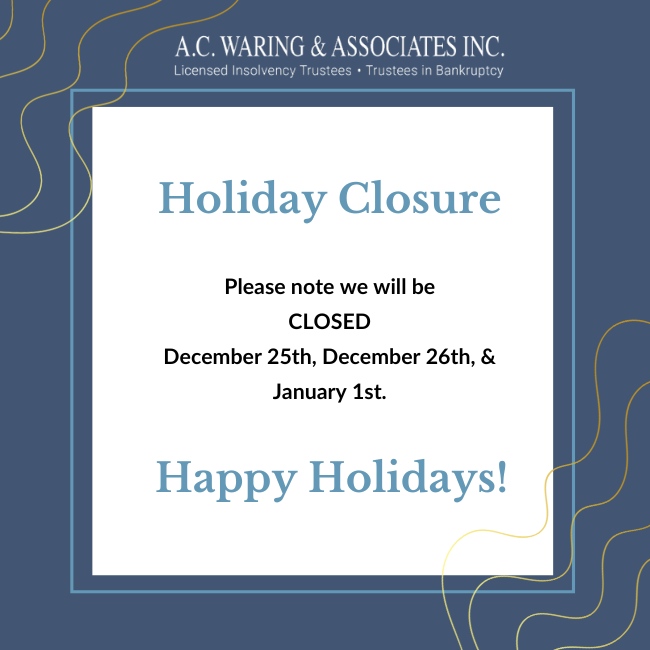How Debt Consolidation Can Help You
The average Canadian owes $8,500 in consumer debt, excluding their mortgage. While this amount of debt can be manageable if you earn enough money, a mountain of debt can be hard to summit for those who struggle to make ends meet.
Many Albertans who struggle with debt haven’t been able to pay their bills on time for months or even years. As a result, many feel overwhelmed by their debt and worry that their poor credit could damage their financial future.
Some turn to payday loans, whose sky-high interest rates only add to the problem. Others wrongly believe that debt consolidation loans are the only answer to their financial woes.
Before you turn to payday loans or other loans, there are a few things you can try to get yourself out of debt, such as:
- Tracking your spending
- Delaying major purchases
- Trimming unnecessary expenses from your budget
- Making sure to pay more than the minimum balance on your credit card
But, if you feel like you are in over your head, help is available. There are a variety of programs and services in Alberta to help with debt relief, including debt consolidation.


What Is Debt Consolidation?
Debt consolidation is, to put it simply, the process of combining 2 or more debts into one easily managed monthly payment.
Debt consolidation can involve taking out a large loan and using it to pay off your smaller loans. Though this strategy may save you money on interest overall, a debt consolidation loan is still a loan and will keep you in the cycle of debt if you aren’t able to pay it off. A loan may not work for you if you are in deep financial trouble, even if the interest rates are less than your present list of loans.
An alternative to a consolidation loan is a Consumer Proposal.
A debt consolidation process, known as a Consumer Proposal, is a formal arrangement that allows a Licensed Insolvency Trustee (LIT) to work to arrange for a settlement agreement with your creditors. To do this, a LIT will have the effect of combining your debts into a single monthly payment. Depending on your unique needs, your relationship with your creditors, and what factors are hampering your debt-repayment efforts, your LIT will likely be able to create a settlement arrangement that is more affordable for you.
Who Is a Candidate for Debt Consolidation?
If you wish to take out a loan to pay off your debts, you will need to meet with your bank or lender to ensure you meet their qualifying criteria.
However, most people in financial difficulty do not qualify for consolidation loans. In many cases, a person needs an acceptable credit score and a steady income stream to qualify. Your monthly expenses will also be compared to see if they are at a reasonable level relative to your monthly income.
It is important to note that a consolidated loan is still a loan. The interest may be lower, but you still have to pay your debts off in full, and you still need to be mindful of variable interest rates, which can hike up your payments if rates change. All future events, like job loss or illness, could also have an unexpected effect on your ability to pay off the loan.
Often, debtors try several ways to handle their debt obligations, including additional loans, and then fall behind in payments. This increases an already problematic credit history. You can talk to a Licensed Insolvency Trustee about other debt solutions for your situation. The trustee will work with you to determine which strategy or strategies are available to you.
Options for Albertans With Poor or No Credit
Poor credit or no credit can affect your ability to qualify for a general debt consolidation loan, but this does not necessarily affect your ability to consolidate your debts through a Consumer Proposal. You can appoint a trustee to facilitate this process.
Debt Consolidation Loan vs. Consumer Proposal
Debt consolidation refers to any strategy that may make your debts more manageable by consolidating them into a single monthly payment.
A Consumer Proposal is a type of debt consolidation strategy that does not involve obtaining a new loan. It is a formal process only administered by federally licensed trustees and is a legally binding arrangement, once it is accepted by the majority of the unsecured creditors.
A Consumer Proposal is administered by a federally appointed Licensed Insolvency Trustee and involves having a trustee consider your situation and recommend an appropriate proposal. That is, an offer to pay your creditors a portion of what you owe them, extend the time you have to pay your debts (up to 5 years total), or both, which they will then present to your creditors on your behalf.
Under a Consumer Proposal, you make monthly payments to the trustee, who then periodically distributes that money to your creditors . A Consumer Proposal can help you reduce the amount you owe overall, avoid wage garnishments, and likely eliminate interest on your remaining debts.
Advantages & Disadvantages of Choosing a Consumer Debt Proposal
Filing a Consumer Proposal might be your best option, if:
- Your debts are over $5,000 but not over $250,000 (excluding your home mortgage)
- You have a regular source of income and are able to make pre-determined payments
- You’re unable to repay your existing debts as they come due
- You want to avoid bankruptcy and the rigours regarding income and asset rules
- You are unable to obtain a consolidation loan from a bank because your financial situation is problematic
- You are in danger of impending foreclosure or repossession because of all your other payments
- Your income would be subject to considerable surplus income payments in a bankruptcy
- You need to deal with your debt without adding another loan and interest to your issues
However, if you choose to file a Consumer Proposal:
- You will not be able to choose which debts are included
- You must still deal with secured debts, such as your home mortgage and car loan
- You cannot eliminate your child and spousal support obligations and arrears, student loan obligations (subject to the 7-year rule), government overpayments (e.g. unemployment insurance) or court-ordered fines and debts from fraudulent activities
- The court can nullify the Consumer Proposal if you default more than, or equal to, 3 payments (where payments are made monthly or more frequently) or (if less frequently) 3 months after being in default of any payment that is not remedied within the prescribed time limit
Debtors worry that Consumer Proposals or bankruptcy will affect their credit score. But the reality is that your struggles with debt repayment and missed payments may have already negatively affected your credit score.
Talk to a trustee because unresolved debt issues in the past may affect your ability to attain a mortgage, credit card, or car loan in the future. Further, you could end up subject to garnishes, liens, or foreclosure.
Not paying your bills on time has one of the biggest impacts on your credit score, regardless of how you choose to address your debt after the fact.
Debt Consolidation FAQ
Get some answers to common questions about debt consolidation.
How Does Debt Consolidation Work?
How debt consolidation works depends on whether you want to solve your debt issues on your own or borrow more money to deal with the present debt.
Depending on your unique financial situation and your relationship with your creditors, this strategy could include extending your payment schedule (thereby allowing you to make smaller monthly payments) or obtaining a lower interest rate on the remaining portion of debts.
How Do I Know if Debt Consolidation Is a Good Idea for Me?
Whether or not debt consolidation is a good strategy for you depends entirely on your unique financial circumstances, personal situation, and commitments.
To determine the best way to address your outstanding debts, talk to a Licensed Insolvency Trustee. Our consultations are free.
What Types of Debt Can I Consolidate Under a Consumer Proposal?
Which debts qualify for a Consumer Proposal depends on your unique circumstances and what your creditors agree to.
You can consolidate:
- Credit card debt
- Unsecured personal loan debt
- Non-government student loan
- Medical bills
- Residual repossession debt
You cannot consolidate:
- Mortgages
- Auto loans
- Certain student loans
- RV loans
If you want to consolidate your debt without taking on more debt, please speak to a Licensed Insolvency Trustee.
What Should I Expect While Talking to a Trustee?
The first step is to arrange a meeting with a Licensed Insolvency Trustee. Licensed Insolvency Trustees are federally regulated professionals whose job it is to provide both advice and services to individuals and businesses experiencing debt problems.
Your trustee is there to help you get a handle on your finances, make informed choices, and act as an intermediary between you and your creditors. All you need to do is table all your financial matters and discuss your situation openly with the view of arriving at a solution to your indebtedness.
When you meet with a trustee, they will help you:
- Consider your amount of debt
- Help you determine what budgetary items are preventing you from paying off your debts as required
- Suggest other alternatives, such as paying off the smallest debts first
If you proceed with a Consumer Proposal, the trustee will register your file with the Office of the Superintendent of Bankruptcy (OSB) and send notice of the Consumer Proposal to your creditors.
If your creditors are willing to accept the strategy proposed to them by the trustee, the trustee, as agreed, will receive and distribute the funds along the way to your creditors.
If you are feeling overwhelmed by your debt, A.C. Waring & Associates Inc. is here to help. We have been Licensed Insolvency Trustees and trustees in bankruptcy for over 25 years. We pride ourselves on making it easy to get the advice and support you need. Simply call our office or book an appointment. Or drop in for financial advice or a free consultation.
Where To Find Us
Find us in the First Edmonton Place building on the corner of Jasper Avenue and 107th Street, behind the Corona LRT Station. Street meter parking is available along Jasper Avenue as well as 106th and 107th Streets, and paid surface parking is off of 106th Street, and underground parking for First Edmonton Place is off of 107th Street.

A.C. Waring &
Associates Inc.
- First Edmonton Place
410-10655 Jasper Ave NW - Edmonton, AB T5J 3S9
Contact
Information
- Phone: 780-424-9944
Hours Of Operation
- Monday: 8:30 AM – 5:00 PM
- Tuesday: 8:30 AM – 5:00 PM
- Wednesday: 8:30 AM – 5:00 PM
- Thursday: 8:30 AM – 5:00 PM
- Friday: 8:30 AM – 5:00 PM
- Saturday: Closed
- Sunday: Closed
Our Google Reviews

Our Testimonials
Dear Arthur and Team,
I want to give you a big thank you for all your assistance during my Bankruptcy. I am glad I had you as my team. You were very kind and knowledgeable. You were great listeners and supported me through this long and difficult process. I learned a lot and grew as a person. I know I will never get into a similar situation in the future. Thanks again.
Wishing you all the best.
M.
Again, thank you Amanda for everything you’ve done to help me with
everything I really appreciate it ! You are Awesome !!
B.U.
Dealing with the wonderful people at A.C. Waring has made a traumatic experience hurt a whole lot less.
Everyone there has treated me with nothing but the utmost respect and kindness.
I have nothing but high praise for everyone there.”
J.G.
“Thank You!
Thanks to Stan and everyone at A. C. Waring for making this process simple and easy.”
R.C.
“I appreciate your kindness
Kim was really good. I always felt calmer after talking with her. Please let her know I appreciate your kindness.”
C.G.
“Shanaz, thank you for your understanding, thoughtful support and advice through an extremely difficult time assisting us in resolving our financial difficulties and allowing us an opportunity to get back on our feet.
We are extremely grateful to you and your company for the important service you provide to people and families facing financial adversary in these trying times.”
M & H.
“Thank you!
Dear Pat, Thanks again for your Totally Awesome help!!”
M.V.
Fern,
Thank you so much for making my life better. It means so much that I can at least get up in the morning! Thank you again.
J.K.
“Shanaz and Team!
Our heartfelt gratitude to you all. You provide such an important and life changing service and there are no words to express how grateful we are for all you do.”
K & R
“Although we are not done with our bankruptcy yet we just wanted to say thank you for taking a totally overwhelming situation and making it so much easier for us. You have explained everything along the way and reassured us that we will get through this. Stan has always been there when we had questions. I’m so glad you have been there for us. Thanx for all you do.”
S & G
“To the most sweetest Lady EVER…
Thank you so much for being there for us, for helping us out and for giving us a second chance at our financial life. If it wasn’t for you we would not be where we are right now and probably would not have been able to move back home this quickly and unexpectedly.
So thank you for all that you have done for us and continue to do. You and your company have been a life saver, changed our lives (both us and kids) in all aspects and ways possible! We will forever be grateful to you and hopefully one day be able to physically see you and give you a HUGE hug.
Take care, and if you ever travel our way to Eastern Canada, please contact us…our door will always be open to you and your loved ones!!!”
J.B. and L.B. Family
“Very grateful!
Dear Shanaz,
Thank you for all you’ve done for me, I am very grateful for you! God bless you Shanaz.”
JT
“What truly matters…
Thank you so much for taking the time to speak with me today. I know how incredibly busy you are, yet you made me feel like a special person and someone who is valued. You probably make all of your clients feel that they.
Please tell others to never give up hope and to keep their loved ones close, as that is truly what matters.”
H. & G.
“Thank you so much!
It was great meeting you. Thank you so much for explaining the bankruptcy process to my brother and I. You are very knowledgeable and friendly and you helped my brother a lot.”
E.S.
“Shanaz, Thank you for your guidance and expertise.
Shanaz, Thank you for your guidance and expertise. I appreciate all the help you have given me. Seriously, Thank You from the bottom of my heart! (I’m no doctor, but apparently that’s where the most grateful part is.)”
C.M.
“Thank You
Arthur, Heather and Beth,
Thank you 1000 x 5!!”
M.S.
“Thank you for your help!
Hi Shanaz, I had a second and wanted to thank you for your help!”
L.D.
“Thank you for all you’ve done
Thank you so much for all your help! I appreciate all that you have done for me!”
C.
“Thanks and Appreciation
With thanks and appreciation for your help”
D.A.
“Thank you
Just want to say Thank You for all your help.”
J.T.
“Thank you so much for all your kindness, wisdom and support.
We are so grateful for you.
We will gladly refer our friends and family to you.
Many beautiful blessings in your life.”
T. and T.B.
“Good Morning
I would like to thank the staff for helping me during my bankruptcy.
Thanks once again.”
J.B.
“Happy New Year to Everybody
Because of you guys i was able to have a better holiday.
Thank you so much.”
G.L.
“Thank you and your Company for your assistance
I am writing this letter to thank you and your Company for your assistance at my hard times. I was your client in 2015-2017. At that period you supported me both financially and even psychologically. Your professional advice and tact helped me greatly to overcome my temporal financial difficulties and to keep the power to live further. Moreover, you and your highly qualified personnel, especially Beth Bui, who was my adviser at that time, did your best. As a result, I even managed to avoid my depression.
Once again, I just wanted to let you know how much I’ve appreciated your advice and assistance.
Yours truly,”
I.K.
“Much appreciated.
Thank you Shanaz, for all your help. Much appreciated.”
Mr. and Mrs. B
“Your staff are great
Arthur, it was good to talk to you. Your staff are great too and I have learned a lot. Thank you.”
G.
“Thank you for all the help
Dear Shanaz,
I want to thank you for all the help you have done for me. Hope things are well with you and your family.
Thank you so very much,”
J.T.
“Such a good experience
Such a good experience. After a change in finances left us without many options, so glad A. C. Waring and Associates have been there every step of our recovery process.”
R.F.
“I can’t thank you enough
Dear Shanaz:
Hope things are going okay with you and my accounts. If You need to call me please do. I can’t thank you enough for what you are doing for me. Please take care,
Yours truly,”
Joyce
“Thank You for Being Thoughtful
To the A C Waring & Associates Family,
Thank you for being so thoughtful. You can’t imagine how much it’s appreciated.”
M and R P-K
“Appreciate Your Consideration
Hello Shanaz,
You are a very special and dear person. I so appreciate your consideration!
Sincerely,”
DB
“Always There for Me
To AnnMarie:
Just a Thank You for all your help at a time in my life that was very hard for me. You were always there for me even when I could be a pain. Your help through this process helped me so much. I would like to thank everyone that had a part in the process from beginning to end. Thank you all. Also I feel I should include the wonderful man that hired all these great people, Mr. Arthur Waring. Bless you all. Thank you all again for all your help through the bankruptcy. All the best in all of your futures. You are a great bunch of people. Thank you with all of my heart.”
V.N.
“Made Our Lives Better
Shanaz,
My husband and I cannot thank you enough for all of your assistance. You have made our lives so much better. I hope you have a wonderful New Year.”
Mr. and Mrs. H
“Thank You
Arthur, Heather and Staff,
Thank you for all your help.”
Mr. and Mrs. C
“Appreciated Your Help
AnneMarie,
I appreciated all your help in this solution. Wishing you and yours all the best!”
RG
“Truly an Angel
Shanaz,
Thank you for everything you have done for us and our family. We will keep referring to you! You truly are an Angel.”
M
“Thanks for everything
Hi Fern,
Thanks for everything. Sept 9th was stressful & exciting! Soooo glad I’m “done”.
Thanks-thanks-thanks.”
C.K.
“Helping You When You Need It
Merry Christmas:
I’d like to thank you for getting me through a tough time.”
R
“Thank you for your patience
Fern and Arthur
Thank you for your patience in this trying period for me. Your patience and calmness have been very much appreciated as I worked through this. I never in my life thought I would be going through bankruptcy, it has been most disconcerting. That said, there is reassurance in Karma now that the police have just about finalized the materials to charge and try Mr. C. Thank you once again.”
W.K.
“Thanks to You Both
Hi AnneMarie and Dana,
I just want to take a minute to thank the both of you for all of your assistance in getting me through this.”
DJ
“Special & Dear
Hello Shanaz,
You are a very special and dear person. I so appreciate your consideration!”
DB
“Much Appreciated
Dear Fern,
I appreciated everything for your goodness to me. God bless.”
RB
“Made Our Lives Better
Shanaz,
We cannot thank you enough for all of your assistance. You have made our lives so much better.”
S and SH
“Helping You Find a Fresh Start
Dear Laverne,
Thank you for all your help, patience and understanding during this last year in my bankruptcy. I am glad to put this part of my life behind me and start fresh. I could not have done it without the support you and the staff at A.C. Waring & Associates Inc. offered me.
Thank you,”
A
“Life a Lot Less Stressful
Thank you, Shanaz, again, for all that you have done for us. Too bad we did not do this a lot sooner. It sure opened our eyes and life is a lot less stressful when you don’t receive phone calls from creditors. Thanks again.
God bless you all.”
L and DR
“Great Professionalism
A.C. Waring & Associates,
I would like to thank you very much for the great effort you have shown in arranging the many details required for finalizing the contract design.
Great professionalism.”
F
“Thanks So Much
This poem sent to Shanaz:
“Some impart wisdom or comfort and care.
Some point out the path, and some take you there.
Some warm the heart with a human touch.
You have all these gifts…
Thanks so much.”
M and AA
“Personal Service
Thank you Mr. Waring and Laverne:
I thank you for all your help in encouraging me through this insolvency. I am finally getting on my feet again.
Thanks,”
R
“Beyond Expectations
Hi Shanaz,
I can’t thank you enough, but I hope you know that Dave and I appreciate everything you’ve done. We were even able to put some monies aside. It is a very good feeling to be able to pay for things in cash. Thank you again. We will be in touch with you later.”
L and D
“Professional Support
Dear Laverne,
Just a short note to thank you for all your help involving my file (sorry I’m a bit tardy sending you this card). Approximately mid-August I experienced a relapse and I just started getting back on my feet. I sincerely appreciate the support and guidance you afforded me! All the best to you in the future, take care.
Sincerely,”
D
“Debt Experts
Hi AnneMarie,
I am sorry for the late reply. I received the discharge 2 weeks ago. At work, there’re a lot of things to do. Home is no different. I thank you and A.C. Waring & Associates Inc. very very much for helping me. Without A.C. Waring & Associates and you, my life would have been miserable. With your help and ADDAC classes, I am on the right track. I want to be on this track forever. I don’t want to think of the place that ruined my life. I was not very smart when I made this big mistake.
Thank you AnneMarie,”
W
“Much Appreciated
Fern and Arthur,
Thank you for your patience in this trying period for me. Your patience and calmness have been very much appreciated as I worked through this. I never in my life thought I would be going through a bankruptcy. It has been most disconcerting. That said, there is a reassurance in karma now that the police have just about finalized the materials to charge and try Mr. C.
Thank you once again,”
WK
“Help Starting Over
Good Morning Shanaz,
All of this (debt) has been weighing on my mind for far too long. I can’t thank you enough for all your advice, help and time.
You are truly a beautiful lady with a genuine soul. I hope everything works out for me. I just need to start fresh and over…”
J.C.
“Kindness & Compassion
Thank you for your kindness and compassion. May God richly bless you and your family.”
M. and S.
“Made it Come Through
Thanks for all the effort you put into marking this come through. Thank you!”
N.C.
“Sincere Appreciation
A very special thank you with sincere appreciation.”
K.V.
“Thank You for Your Kindess
Thank you, Heather, for being so patient and kind to me. Many blessings.”
D
“All the Best for 2015
Heather,
All the best for 2015. Thanks!!!”
J and M
“Good Morning Shanaz & Kim,
I’ve had you ladies on my mind lots lately, and just wanted to reach out to tell you thanks!
I can’t believe it’s been 5 years ~ and I’m at the finish line of this part of my life. One more payment ~ whoopie!!!!
I owe you two a million thanks! Not only for setting me up for positive change in my life, but also for your kindness, compassion, and understanding throughout this whole process! I couldn’t have done it without you both!
Kindest regards,
L.”
L.
“Dear Ken, Thank you for your excellent advice.”
J.F.
Thank you for your invaluable assistance in resolving this matter. I highly recommend AC Waring and Associates to anyone I know who may be experiencing difficulties, as my family and I did.
Doug
Management + Staff, Thank you for your kindness & WAKING ME UP.
Peggy
Blog
Consumer Proposal vs Debt Consolidation: When to Consider Each
Debt ManagementThe choice between a consumer proposal and debt consolidation depends on your total debt, your credit score, and whether you need legal protection from creditors. […]
How Debt Consolidation Works in Canada: A Detailed Guide
DebtDebt ManagementDealing with debt can feel overwhelming. You might be tempted to think of “overwhelming debt” as owing a large amount of money. Sometimes, though, meeting all of your minimum monthly payments to several different creditors can be a challenge even when the overall debt number is not that high. In cases like this, many debt […]
What Is the Role of a Licensed Insolvency Trustee in Bankruptcy?
BankruptcyLicensed Insolvency TrusteeA licensed insolvency trustee (LIT) is the only regulated professional in Canada who can manage bankruptcy filing or consumer proposals. […]
Consumer Proposal vs Debt Consolidation: When to Consider Each

The choice between a consumer proposal and debt consolidation depends on your total debt, your credit score, and whether you need legal protection from creditors. […]
How Debt Consolidation Works in Canada: A Detailed Guide

Dealing with debt can feel overwhelming. You might be tempted to think of “overwhelming debt” as owing a large amount of money. Sometimes, though, meeting all of your minimum monthly payments to several different creditors can be a challenge even when the overall debt number is not that high. In cases like this, many debt […]
What Is the Role of a Licensed Insolvency Trustee in Bankruptcy?

A licensed insolvency trustee (LIT) is the only regulated professional in Canada who can manage bankruptcy filing or consumer proposals. […]
Professional Affiliations





